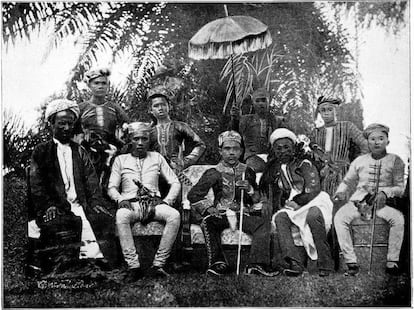The fascinating tale of a multimillion-dollar lawsuit featuring sultans, oil and a renegade lawyer
The Sultan of Jolo’s heirs are seeking billions from the Malaysian government for mineral rights in northern Borneo, while a Spanish attorney faces criminal charges for his role in the case

“Who’s paying for the party?” It’s a perfectly normal question to ask after any indulgence. It’s also the question people are asking about a spectacular international arbitration case that reads like a John le Carré novel. Embroiled in this tangled web of intrigue are the heirs of a long-gone sultan, a Spanish lawyer, the Malaysian government and a multimillion-dollar investment fund.
The case traces back to an obscure 1878 commercial agreement between Sultan Jamad al Alam, who ruled over the Jolo island group in present-day Philippines and Malaysia; Baron von Overbeck, the Austro-Hungarian Empire’s consul in Hong Kong; and British financier Alfred Dent. The sultan granted a lease with exploitation rights on a huge tract of land he owned in Sabah, a Malaysian state on the northern tip of Borneo. The contract was later renewed by the British Borneo Company and then taken over by the British Empire.
Malaysia’s independence in 1963 renewed interest in exploiting Sabah’s oil and gas deposits, which account for a quarter of the country’s energy resources. The area also has immense African palm oil farms. For a few decades, the Kuala Lumpur government paid a symbolic annual fee of $1,200 (€1,100) to the sultan’s heirs, but stopped in 2013. That’s when an armed group from the Philippines, presumably followers of self-proclaimed Sultan Jamalul Kiram III, tried to take control of the area and its natural resources. The Malaysian air force launched airstrikes and ground troops recaptured the territory after massacring the insurgents.
Saying they were heirs of Sultan Jamad al Alam, eight people then decided to sue the Malaysian government through international arbitration to claim rights under the original lease agreement. The 1878 pact clearly stated that any future disputes between the parties should be resolved by the British consul general in Borneo. But that diplomatic post disappeared long ago, and the British government declined to be dragged into the lawsuit by the sultan’s heirs. They then pivoted in another direction and filed their arbitration claim in Spain, based on peace treaties by which the Kingdom of Spain acquired the sultan’s domains in Jolo in 1878. But under the Madrid Protocol of 1885, Spain ceded the area to the United Kingdom.
The Civil and Penal Chamber of Spain’s Supreme Court (TSJM) appointed attorney Gonzalo Stampa as the arbitrator of the case. Stampa specializes in international mediation and has been practicing law for 30 years. His father, José María Stampa Braun, is an attorney and professor of criminal law who gained notoriety for defending Basque security chief Julián Sancristóbal, charged with kidnapping Segundo Marey during the country’s dirty war on terrorism. He also defended Luis Roldán (a former Director General of the Civil Guard), Lola Flores and Pedro Ruiz for tax crimes; Rafi Escobedo, for the murder of his in-laws, the Marquesses of Urquijo; and Chilean dictator Augusto Pinochet.
“The case is not connected in any way to Spain,” said Josep Gálvez, a barrister practicing in England and Wales who specializes in complex litigation and international arbitration. In an interview with EL PAÍS, Gálvez pointed out that Spain’s Ministry of Justice has already determined just because a territory had once belonged to Spain, “this was not a basis for establishing Spanish court jurisdiction to resolve the discrepancies of the 1878 agreement or to appoint an arbitrator.”
To further complicate matters, a global litigation and arbitration finance firm called Therium has spent over €20 million ($22 million) to fund the legal claims of the sultan’s heirs. Therium’s website has pages about “Investing in the Rule of Law,” “Investing in the Legal Industry,” and “Investing in Access to Justice.” It’s a growing but little-known business that pours huge amounts of money into legal proceedings around the world in exchange for a percentage of the payout from favorable verdicts. At the onset of the proceedings, the British legal team representing the sultan’s heirs went to Therium seeking the necessary financing to proceed with the case.

A wandering arbitrator
Gonzalo Stampa ruled that he would preside over the case, which had already been contested by the Malaysian government on the grounds that it had not been formally filed per the stipulated procedure. The TSJM decided on June 29, 2021, to remove Stampa from the case and grant the Malaysian government’s request for dismissal. Everything related to the case was declared null and void, and Stampa was ordered several times to end the arbitration.
The lawyer did more than just ignore those orders. At the request of the Filipino plaintiffs, he changed the arbitration venue from Madrid to Paris after obtaining an “exequatur,” a legal instrument that enables a jurisdiction to recognize the decisions of another jurisdiction. Stampa issued his final ruling in Paris, granting nearly €14 billion ($15.35 billion) in compensation to the sultan’s heirs. It was only half of the initial claim, but still an exorbitant amount that immediately caught the attention of the international press.
“It’s true that arbitrators sometimes decide to change venues,” said Gálves. “However, this only happens in exceptional circumstances when the physical safety of the arbitrator or the parties involved are threatened. This was not the case here… Stampa has caused a conflict between two jurisdictions that has strained the mutual respect of the relationship.”
A French appeals court subsequently overturned Stampa’s arbitration award, and Spanish prosecutors have charged him with insubordination and professional overreach. If convicted, Stampa could be sentenced to five years in jail. The lawyer, along with over 60 colleagues who wrote an open letter in his defense, has defended his independence as an arbitrator and the principle of minimal judicial interference in arbitration processes. Several experts note that annulment of an arbitration process is significantly more severe than simple interference. Stampa declined our request for comment, citing “professional confidentiality.”
The Malaysian government recently published an open letter in the Expansión newspaper that stated: “In a move that only Mr. Stampa can explain, he decided to disobey the orders of the same court that appointed and later removed him. It is important to note that Mr. Stampa initially asked that the Filipino citizens (the only party that participated in the arbitration) pay him $8 million to arbitrate the case, but ultimately charged the financier that supported them over $2.5 million.” The international law firm of Uría & Menéndez has joined the team of global consultants advising the Government of Malaysia.
The story doesn’t end there
Similar to what other opportunists are doing to Spain in a dispute over renewable energy premiums, Therium continues to invest money in pursuing the case so it can recover its investment. Therium has petitioned France’s Court of Cassation (the court of last resort) to enforce the arbitration award, a decision that’s still pending. In the meantime, the plaintiff’s legal counsel has successfully frozen the assets of Petronas, the Malaysian oil and gas company, in Luxembourg and the Netherlands, a tactic that was unsuccessful in France.
The question remains — who will foot the bill? Therium, who expects a large payout from this historic litigation, has completed several rounds of investor fundraising to finance the ongoing battle against Malaysia.
Sign up for our weekly newsletter to get more English-language news coverage from EL PAÍS USA Edition
Tu suscripción se está usando en otro dispositivo
¿Quieres añadir otro usuario a tu suscripción?
Si continúas leyendo en este dispositivo, no se podrá leer en el otro.
FlechaTu suscripción se está usando en otro dispositivo y solo puedes acceder a EL PAÍS desde un dispositivo a la vez.
Si quieres compartir tu cuenta, cambia tu suscripción a la modalidad Premium, así podrás añadir otro usuario. Cada uno accederá con su propia cuenta de email, lo que os permitirá personalizar vuestra experiencia en EL PAÍS.
¿Tienes una suscripción de empresa? Accede aquí para contratar más cuentas.
En el caso de no saber quién está usando tu cuenta, te recomendamos cambiar tu contraseña aquí.
Si decides continuar compartiendo tu cuenta, este mensaje se mostrará en tu dispositivo y en el de la otra persona que está usando tu cuenta de forma indefinida, afectando a tu experiencia de lectura. Puedes consultar aquí los términos y condiciones de la suscripción digital.









































